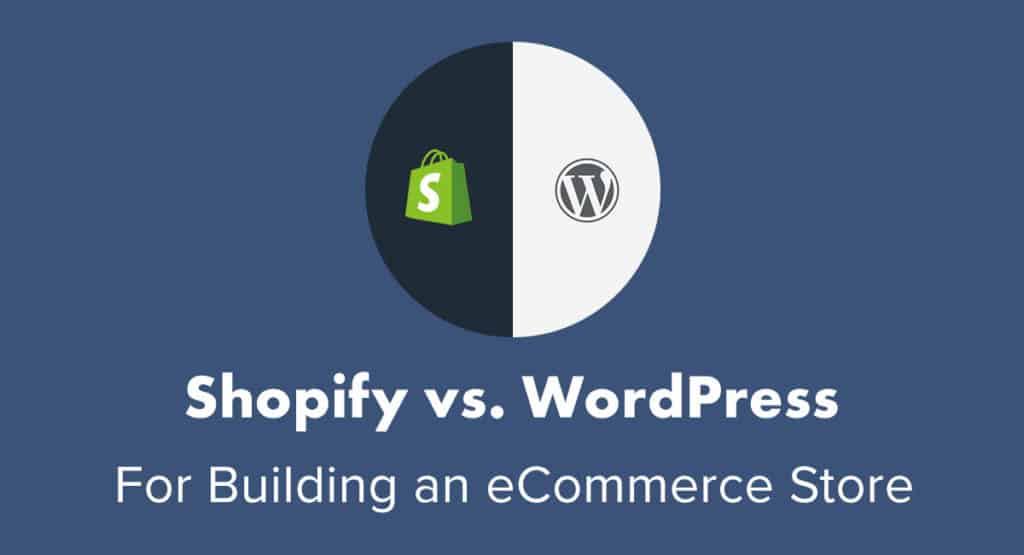
You may wonder, at some point, on the eCommerce website:
Which one is better, Shopify or WordPress? While both platforms allow you to create effective online stores, they are very different as well.
In this post, for both Shopify and WordPress, we break down the key differences in pricing, installation, ease of use, and capabilities.
All of these are important considerations you should consider before investing in a certain eCommerce platform. Let ‘s look at both choices more closely to figure out which is the right match for your online store project.
Including an e-commerce platform, is WordPress for everything?
We have always been an ardent fan of WordPress, and our go-to advice if someone wants a website for some reason.
“-had been,” Oh, why not WordPress? Looking at what ‘s possible with Shopify and how simple it all is, also we started having second thoughts. We mean, WordPress is certainly awesome as a website platform.
It can handle anything you throw at it effortlessly and make your website open and accessible for the whole world to see.
At the same time, an e-commerce shop is an animal of a very special nature, and it is very different from a regular blog or news website. WordPress is designed around content, content that is more or less intended to be accessed for free.
You can publish blog posts, videos , images, and so on, but the key idea is that anybody who happens to come upon the URL can access it.
In e-commerce shops, the reality is different. What they sell sits behind a paywall.
When managing the crucial data of the customer (such as credit cards , personal info), the whole site needs to be vigilant.
It needs to be safe. It also needs to be able to manage incoming orders, process them, and ensure that nothing falls through the cracks along the way, to top it all off. In other words, relative to traditional publishing outlets, there are many items that are distinct about e-commerce stores. We even have to be prepared at that stage to acknowledge the fact that WordPress isn’t ideal for anything.
Often, you just need a platform that has been designed to run an e-commerce store.
The big difference between WordPress and Shopify The key distinction between Shopify and WordPress is that Shopify is an online tool / service in a sentence, whereas WordPress is a stand-alone app that you need to install yourself.
All you have to do in order to use Shopify is go to Shopify.com and sign up to build an account.
You just need to go through a quick setup once finished, and your e-commerce store is up and running.
On the other hand , it takes a lot more steps to use WordPress as your e-commerce platform: First, you need to purchase a domain and a web hosting account where you can have WordPress built as the default version.
For your website, you need to select a theme (design), plus a bunch of plugins to take care of SEO, social media integration, etc.
After that, to provide you with all the e-commerce characteristics (those are not built into WordPress), you need a plugin like WooCommerce.
Finally, you need to go through your e-commerce store’s configuration process (the store specifics, integrations of payment gateways, goods, and so on).
Such people should take their own time, too.
Last but not least, with Shopify, you also get help, which means that you can easily contact the support team if you ever experience any issues with the app, and they will (likely) resolve it. With WordPress, per se, there’s no help.
Shopify is like going to IKEA, buying a table off the rack, and then just assembling it at home. Think of it this way.
WordPress is like going to the hardware store, buying planks, screws, glue, instruments, and then going home and creating your own table.
Full disclosure: if you end up buying Shopify or Bluehost+WooCommerce via the referral links in this comparison, WebsiteSetup receives a fee. Thanks for your support!
Shopify … What’s that? The facts are here:
An all-in-one solution / tool for e-commerce.
It enables you to create a functional e-commerce store from scratch, without the assistance of a designer or developer.
You do not need any coding skills to use Shopify. Around $29 to $299 a month, it’s a paid instrument.
It helps you to sell whatever you want (goods , services, digital and physical products, as well as dropships).
Use it offline and online (you can use it as an online store, but you can also use something called Shopify Point of Sale, which is their retail store system that allows you to combine your on-location store with your Shopify setup).
About 100 + templates for online shops to choose from (some of them paid).
Each new site, for example, YOURSTORE.shopify.com, gets a custom subdomain for free.
24/7 support is there.
What Is WordPress (WooCommerce)?
First of all, WordPress is a lot of material, but for the purpose of this resource, we concentrate solely on the e-commerce side of the spectrum and omit a large part of the features and skills of WordPress.
Tools for an all-in-one website.
This enables you to create any sort of website, provided that the slightly technical configuration can be done, including installing the program itself, installing plugins, installing a theme, and then installing an e-commerce plugin to manage the operations of the shop.
There are some website building skills needed. You can need coding or design skills as well, depending on the customizations you choose to make.
The program for WordPress is free. You need to sign up for a web host and purchase a domain name in order to use it.
You can get started with WordPress for around $5 / month when all is put together. Nice management features for content. Thousands of themes / designs, both free and charged, to choose from.
Exceptional possibilities of extension by plugins.
No direct support, but a very supportive group of support.
When do you use Over WordPress shopify?
Shopify stands out as an e-commerce solution designed for everyone.
We mean people who may not have any website building or coding experience, but still want to be able to develop an amazing online store on their own.
The biggest advantage of working with Shopify is that you can get started in minutes and almost instantly begin serving your first clients. You also don’t need to be fully acquainted with the different realities of the e-commerce industry itself, even leaving aside the coding and website construction skills that you don’t need.
Shopify lets you configure items such as inventory, taxes, shipping settings, etc.
In other words, the last boring element of the organization is solved. Secondly, Shopify is also a solution that is very inexpensive. You just need $9 a month to get started.
You get access to more than enough site designs and customization choices for that amount. “Answer in-a-nutshell to” When to use Shopify? ”:
Option a): If you don’t have some sort of website, use it, and you want to quickly launch a quality e-commerce shop. Choice b): Use it if you don’t have any experience in design , coding, or creating websites, and you don’t want to hire someone to set up an e-commerce store for you.
Choice c): If you want to combine your online shop with your on-location offline store, use it.
Option d): If you need a great e-commerce platform with customer service access, use it … just in case.
If you are mentioned in any of the above, go to Shopify.
If you want to sell physical goods, digital downloads, programs, or even dropships is also meaningless.
Shopify is able to administer everything.
The sum of goods you sell is not a consideration (whether it’s 1 or 1000) either. When to Use Shopify Over WordPress? WordPress is a house of influence.
It’s like the ideal forum for websites, capable of running all sorts of websites.
But the catch is there. Or, rather, a few catches.
WordPress is a piece of software: you can get it free of charge, but then you have to install it yourself on a web server, set it up, and finally launch a website with it. WordPress is, out of the box, predominantly a blogging site.
It offers no functionality for e-commerce at all.
Those that you can acquire through plugins. Such as the popular WooCommerce. You need a bunch of other plugins, apart from the e-commerce plugin, to manage some regular options such as SEO and social media. To make your e-commerce store appear special and original, you will need a good-looking and brandable theme (design).
What all this means is that WordPress could be a solution for a slightly more savvy consumer. You need to feel comfortable hand-editing PHP files, connecting via FTP to your server, and spending the afternoon on some configuration panels.
That said, a great e-commerce plugin is the aforementioned WooCommerce. It gives you all the features you could ask for, such as shopping carts, catalogs of items, online payments, discounts, etc.
The plugin, most importantly, is free! Alternative shopping carts from WordPress can be found here. “In-a-nutshell response to” when to use e-commerce with WordPress?
”:
Option a): Use it if you already have a WordPress site and the gui is familiar to you. For example, for your goods and orders, WooCommerce uses the same admin panel organization, so there is no extra learning curve.
Choice b): If you already have a WordPress site, use it and you want to reduce costs by not needing to spend any more funds in a new platform for e-commerce. Choice c): If you’re comfortable playing sometimes with source code, use it.
Choice d): Use it without any fast-reacting customer service if you can cope.
About that last part: You might feel that customer service is not such a big deal right now. But bear in mind that we’re talking about your company here. For instance, if anything happens that causes your site to go down, it can and will mean a significant hit to your business income if you don’t have it online for the entire day. Even, while we’re at it, a great deal of stress.
It’s those times when we appear to value 24/7 working customer service!
Shopify or WordPress?
We have an even shorter response for you if the choices above do not suit your taste.
Just bear in mind that this is an immense oversimplification. You’re better off following one of the choices above in certain situations. But if you want an uber-short reply, then it’s here:
Only install WooCommerce and launch an e-commerce store as an aspect of the existing website if you already have a WordPress website.
Launch your e-commerce store with Shopify if you don’t have a website yet.
There are two reasons for me to do so: to save both time and money.
Very simply, if you already have a WordPress website running, then only adding an e-commerce component to that website instead of creating something new would often be easier and cheaper. If you don’t have a website yet, on the other hand, it’s faster and easier to go the other path and launch an e-commerce store like Shopify with a specialized platform.





